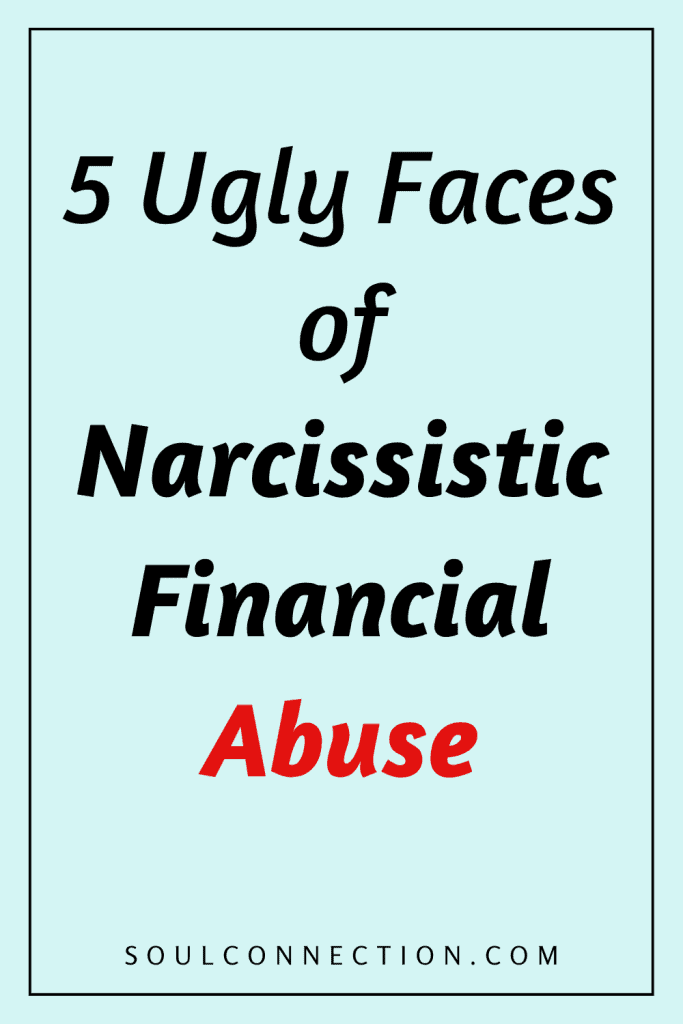Nothing says “I love you” quite like a shared bank account… at least, until that bank account starts to feel like a bear trap. Narcissistic financial abuse is the kind of relationship sabotage that doesn’t always look like a neon sign blinking DANGER.
Sometimes, it just feels like quicksand. And even if your narcissist can’t remember your birthday, they’ll never forget how much you spent on groceries.
Let’s pull back the curtain on five ways narcissists weaponize money—often with the subtlety of a sledgehammer—and what real people can do to pry those fingers off their wallets and self-worth.
1. Dictating Every Penny
“Let’s make a budget,” they said. “It’ll be fun,” they said. And then, suddenly, every transaction requires a full PowerPoint presentation and a groveling apology if you dare to buy off-brand chips.
The narcissistic controller might insist on scrutinizing every expense—right down to the extra oat milk in your latte. This isn’t financial responsibility; it’s surveillance.
They might demand receipts, require “permission” for every purchase, or even set up bank alerts so they know when you so much as sneeze near an ATM.
What’s really going on here? Control. Micromanaging your spending lets them feel superior, while leaving you anxious (and maybe a little embarrassed at the checkout line).
It’s not about the money; it’s about making you feel like a child asking for pocket money.
How to fight back:
Keep your own separate bank account, even if it’s just for “mad money.” Start stashing small amounts if you can. Talk with a trusted friend or financial advisor about setting up safeguards.
And when the next budget “meeting” feels like an interrogation, remember: “partnership” doesn’t mean “parole officer.”
2. Hiding Money and Financial Secrets
Narcissists do love a good secret, especially when it means keeping you in the dark about bills, debts, investments—or sneaky side accounts that only they control.
There’s nothing quite like realizing your partner has a Rainy Day Fund you’ve never heard of, or that your mortgage is three months late because they “forgot” to mention it.
Financial secrecy is their way of holding all the cards. If you don’t know where the money is—or how much there is—you’re left guessing.
That makes it a lot harder to leave, make big decisions, or even fix a leaky tap without their say-so.
Maybe they insist they’re “just better with numbers,” or dismiss your questions by saying you “wouldn’t understand.” Maybe they shame you for asking about money at all.
Spoiler: adults get to know if the power bill’s been paid.
How to fight back:
Start putting your name on bills and accounts wherever possible. Request copies of bank statements and credit reports—yours and any joint accounts.
Don’t let shame or confusion keep you quiet; ask for clarity and don’t buy the “too complicated” routine. If things seem suspicious, get a second set of eyes on the paperwork (or, you know, a lawyer).
3. Sabotaging Earning Power
It’s tough to be independent when your partner keeps “forgetting” to pick you up from your job interview or insists your time would be better spent alphabetizing their sock drawer.
Narcissists often find creative ways to undermine your ability to work or earn.
Sometimes it’s blatant—mocking your career goals, refusing to help with childcare, or guilt-tripping you for not being home 24/7.
Sometimes it’s sneakier: they might “accidentally” call in sick for you, spill coffee on your laptop, or start an argument right before a big meeting.
All this boils down to one goal—keeping you dependent. If you can’t bring in your own resources, it’s easier for them to control how you live, what you buy, and even whether you can afford to leave.
How to fight back:
Hold your ground. Apply for jobs, take classes, or pursue side gigs even if it means working around their sabotage. Build a network outside the relationship—colleagues, friends, that one neighbor who always asks about your cat.
Document interference with your work, just in case you need a record. Above all, don’t buy into the myth that you’re incapable or “better off staying home.” Your ambitions are valid—no permission slip needed.
4. Guilt-Tripping and Gaslighting About Money
Narcissists have a sixth sense for turning financial conversations into guilt-ridden odysseys. Maybe you finally buy yourself a new pair of shoes, and suddenly, you’re accused of bankrupting the family.
Or you ask about a missing paycheck, and the response is a Shakespearean tragedy about how you “don’t trust them.”
Gaslighting is the name of the game: twisting facts, denying agreements, or insisting there was never enough money for that household repair you both discussed last month.
You start to doubt your memory, your priorities, and, before long, your sanity.
This tactic is less about dollars and cents and more about eroding your confidence. If you’re always apologizing, you’re less likely to challenge their version of the story—or question where the money’s really going.
How to fight back:
Write things down. Keep a household ledger, email agreements to yourself, or use shared apps that create a paper trail. When the guilt starts rolling in, remind yourself that wanting transparency isn’t selfish—it’s responsible.
If it helps, talk to a therapist or support group to get reality checks and scripts for pushing back on the emotional shenanigans.
5. Financial Retaliation and Withholding
Here’s where things get especially nasty. Upset the narcissist? Suddenly your “allowance” disappears, your debit card is declined, or the joint account mysteriously empties.
Financial retaliation is punishment, pure and simple. Missed a phone call? No petrol this week. Didn’t laugh at their joke? Guess you’re not getting groceries.
Withholding money—or access to money—is a way to make you squirm. The aim is to keep you off-balance, constantly worried about when the rug will be pulled out next.
It’s abuse dressed up as “teaching a lesson” or “setting boundaries,” with all the warmth of a tax audit.
How to fight back:
Document every incident where money is withheld or removed as punishment. If possible, set up a private emergency fund at a separate bank.
Talk to a trusted professional or advocate about your rights; in many places, financial abuse is recognized as a form of domestic abuse, with legal protections to match.
Don’t let them convince you this is normal. It’s not. And you deserve better.
Reclaiming Control When Narcissistic Money Games Hit Home
Narcissistic financial abuse isn’t just about empty wallets; it’s about feeling powerless in your own life. That sneaky shift—from “we’re in this together” to “I have to ask permission to buy toothpaste”—can happen so slowly you almost don’t notice.
Here’s the good news: knowledge is power, and you’re not alone in this. Support is out there, whether from friends, financial coaches, or legal advocates who’ve seen every trick in the book.
A safe, independent stash (no matter how small) and a clear-eyed support network are worth more than gold.
If you’re caught in the headlights of a narcissist’s financial games, know this: your value isn’t measured by your bank balance, your spending habits, or your ability to memorize every line on the monthly statement.
It’s found in your freedom to choose, your confidence to say “enough,” and your right to a life where money is a tool—not a weapon.
No one gets to hold your wallet hostage. Not even the person who claims to love you most.


